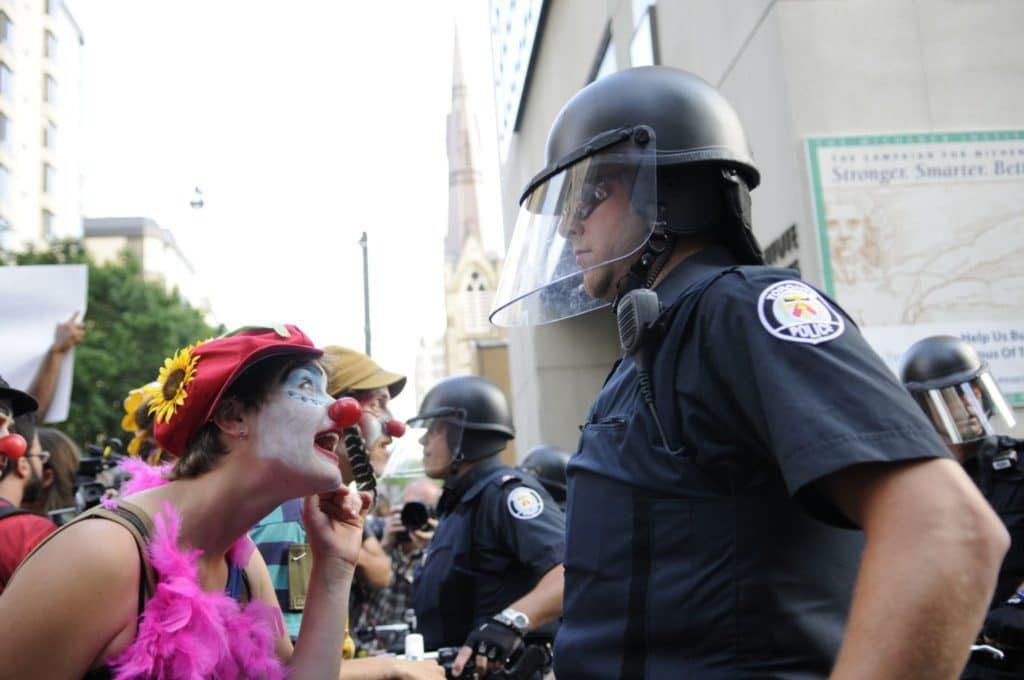The news of the past few weeks has been dominated by coverage of Charlottesville and the rallies, protests, and counter-protests that have emerged in response to what happened in Charlottesville.
Our own state has also responded loudly to the violence in Charlottesville.
The Durham Protests and Arrests
On Monday, August 14, the Confederate Soldiers Monument in front of the old Durham County Courthouse building was pulled down by anti-racist activists to show solidarity with Charlottesville after the violent clash led to the death of 32-year-old Heather Heyer.
Durham protestors tied a rope around the Confederate soldier’s neck, chanting “No KKK, no fascist USA,” before pulling on the rope and sending the statute crashing to the ground.
The crowd of more than 100 people from different groups and organizations including Democratic Socialists of America, the Workers World Party, the Industrial Workers of the World, and anti-fascists, cheered as the statue fell and some even started kicking the statue as it lay on the ground.
On Twitter, Governor Cooper said, “The racism and deadly violence in Charlottesville is unacceptable, but there is a better way to remove these monuments.”
The Durham Police Department didn’t make any arrests due to the incident taking place on county property. In the following days, the Durham County Sheriff’s Office arrested seven people in relation to the Confederate statue being torn down.
Takiya Thompson was charged with participation in a riot with property damage in excess of $1,500 and inciting others to riot – both felonies – as well as misdemeanor offenses for disorderly conduct by injury to a statue and damage to property.
Dante Strobino, Ngoc Tran, and Peter Gilbert were arrested on the same charges.
Three other protestors – Aaron Caldwell, Raul Jimenez, and Elena Everett – were charged with one felony count of inciting a riot and three misdemeanor counts of injury to personal property less than $200, injury to real property, and defacing a public monument.
Jun Cook also turned himself in, bringing the total number of people charged to eight.
On Friday, another group of activists showed up at the Durham County Courthouse to show solidarity with four of the protestors who were having their first court appearance for bringing down the Confederate statue.
This rally, however, was plagued with rumors that the Ku Klux Klan was going to be marching into town to give their own response to the statue’s removal. New rumors circulated and hundreds of people gathered – some with homemade signs and some with rifles – bracing for the KKK’s arrival.
No one from the Klan showed up and the people of Durham decided to throw a block party instead, taking advantage of the crowd and marching around the block and eventually arriving at the courthouse where, after a few tense moments between people on opposite sides, people celebrated.
North Carolina Disorderly Conduct Charges
As more protests and counter-protests continue to occur in our state and throughout the country, it’s more important than ever to be prepared if you plan to attend and participate in one of these rallies.
There’s a good chance, if the rally gets out of hand, that you or someone you know could be charged with disorderly conduct.
The North Carolina statutes say that, “Disorderly conduct is a public disturbance intentionally caused by any person.” It then goes on to describe specific conduct that is classified as disorderly conduct, including but not limited to:
- Engaging in fighting or other violent conduct or in conduct creating the threat of imminent fighting or other violence.
- Making or using any utterance, gesture, display, or abusive language which is intended and plainly likely to provoke violent retaliation, thereby causing a breach of the peace.
- Taking possession of, exercising control over, or seizing any building or facility of any public or private educational institution without specific authority.
- Refusing to vacate any building or facility of any public or private educational institution.
Disorderly conduct is a class 2 misdemeanor punishable by a $1,000 fine and up to 60 days in jail, although if you have no prior convictions that decreases to up to 30 days in jail.
Even though disorderly conduct is a misdemeanor offense, it will stay on your criminal record if convicted. For this reason, it’s imperative to contact a skilled North Carolina disorderly conduct attorney to help you beat your charges. An experienced attorney will be able to craft the best defense strategy to get your charges reduced, dropped, or dismissed so you can continue fighting for justice, your rights, and what you believe in.
About the Author:
Jan Elliott Pritchett is Managing Partner at the Law Firm of Schlosser & Pritchett and one of North Carolina’s top rated criminal defense attorneys. With a practice dedicated 100% to litigation, Mr. Pritchett protects the legal rights of clients who have been charged in federal and state criminal matters, as well as DUI/DWi, motor vehicle accidents, personal injury, and traffic violations. In practice since 1995, Mr. Pritchett has earned a reputation as a highly talented and fearless lawyer, being listed among the state’s “Legal Elite” and recognized as one of the Top 100 DWI Lawyers in North Carolina by the National Advocacy of DUI Defense. He currently serves as the Co-Chairman of the North Carolina State Board of Legal Specialization, Criminal Law Specialty, and Vice-Chairman of the North Carolina Bar Association, Criminal Justice Section.










